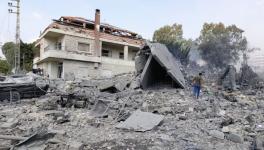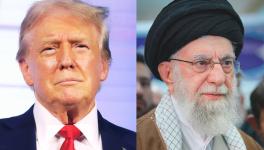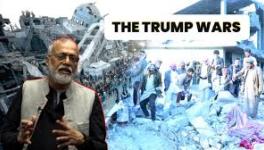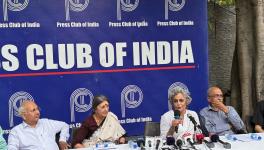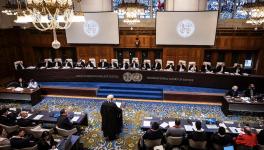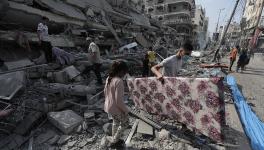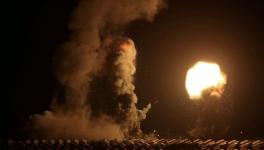Yemen Peace Talks Turn into Crisis Management
UN-sponsored Yemeni peace talks in Switzerland appear to be at risk. The Houthi rebels and the Saudi-backed government forces loyal to President Mansur Hadi have stopped talking directly to each other amid differences over the government demands for the release of senior officials being held by the Houthi rebels. The dispute comes amid fresh fighting between the Houthis and the government forces in which at least 15 people were killed from both sides. The Houthis say they are ready to free the prisoners once a permanent ceasefire has been agreed upon. UN special envoy to Yemen, Ismail Ould Cheikh Ahmed, was shuttling between the two sides trying to bridge differences. In spite of all these new developments, let's assume the talks will resume. If they do, what kind of settlement and government would be expected in Yemen?
Bio - Bilal Ahmed is the associate editor of Souciant.com. He is also a PhD candidate at SOAS, University of London.
Rough Transcript
SHARMINI PERIES, EXEC. PRODUCER, TRNN: Welcome to the Real News Network. I'm Sharmini Peries coming to you from Baltimore.
UN-sponsored Yemeni peace talks in Switzerland appear to be at risk. The Houthi rebels and the Saudi-backed government forces loyal to President Mansur Hadi have stopped talking directly to each other amid differences over the government demands for the release of senior officials being held by the Houthi rebels. The dispute comes amid fresh fighting between the Houthis and the government forces in which at least 15 people were killed from both sides. The Houthis say they are ready to free the prisoners once a permanent ceasefire has been agreed upon. UN special envoy to Yemen, Ismail Ould Cheikh Ahmed, was shuttling between the two sides trying to bridge differences. In spite of all these new developments, let's assume the talks will resume. If they do, what kind of settlement and government would be expected in Yemen?
We are taking this up with our next guest, Bilal Ahmed. Bilal is back by popular demand. You must see his interview yesterday. And he is an associate editor of Souciant.com. He's also a Ph.D. student at SOAS of the University of London. Thank you so much for joining us again, Bilal.
BILAL AHMED: It's no problem.
PERIES: So Bilal, let's start with some prognosis on the peace talks first.
AHMED: Well, the peace talks are under threat, as your report indicated. And the, there are two main reasons why. Three, if you want to get a bit more abstract, which of course we favor. But the first reason why is these prisoners that the Houthis have that they don't want to release--so two of the prisoners are Mahmoud al-Subaihi, who is the defense minister under Hadi, and also Hadi's brother, whose name is Nasser. So as you can imagine, this is a bit personal for Hadi's side, because one of the people is his brother. And these are also people who have been involved in intelligence operations, as well as military operations all over Yemen. But especially in Saada and the northern provinces, where the Houthis are primarily based.
So part of this is that the Houthis want a more permanent ceasefire and a promise of one. But some of this is also that there's a great deal of controversy, especially in the coalition itself, about how to feel about these prisoners and whether or not they should be released.
PERIES: These are high-stake prisoners that they have. I can see why they're holding onto them. So Bilal, yesterday right after the interview you indicated really what we should be discussing is what's next. If these formalities and negotiations succeed, what kind of result and settlement we are going to be looking at, and what the actual government might look like in Yemen. So let's take that up.
AHMED: Well, the problem is that these talks can't possibly result in a new governing framework, because of the people that are actually there. These talks are currently occurring between Hadi's loyalists, [inaud.] Saleh, who are there alongside the Houthis because Saleh's loyalists are currently backing the Houthis, which is itself a bit complicated given that Saleh waged multiple wars against the Houthis before he was deposed from power. But they are, as you can see from that, those aren't all, those aren't all the power interests that are currently at play in Yemen. So you don't have Saudi Arabia at the peace talks. You don't have the United States. You also don't have tribal groups.
For example, your report talked about the fighting in [amare] which left 15 people dead on both sides. The tribal forces in Marib are particularly strong, and they've been particularly well-mobilized against the Houthis. However, the tribal forces don't have their own representative at the talks. They're simply de facto represented by Hadi's loyalists and Hadi himself. But that's not going to be a sustainable governing framework, given the fact that there are so many interests in Yemen with their own ambitions and their own desires from a post-civil war framework.
And it's worth noting that a successful prisoner exchange did occur in the south of the country, but it wasn't strictly speaking between the coalition and the Houthis, as though these are two neat sides that can be neatly defined as such. They were given over by the southern resistance movement, which is, has been jump started especially as of late, out of the interest to form an independent southern federation or an independent southern autonomous zone based on the principles of the old peoples' democratic republic of Yemen.
So as you can see from all this, even at the peace talks, we're talking about sides that are being represented by different sides that don't totally reflect the complexity of the Yemeni political situation. And that is, before we even talk about the fact that Al-Qaeda in the Arabian Peninsula and Islamic State more recently, but Islamic State's a bit new, are also operating within the country, especially in the province of Hadramaut, to the southeast. And you could see a potential situation, even if they resolve these problems in the fact that not everybody who is fighting the war is actually independently sitting at the peace table. Even if they do solve that, you still don't have a strategy for dealing with these terrorist groups. So you could easily just see the civil war evolve into being shifted away from the capital city and major metropolitan centers and towards where these al-Qaeda forces actually are.
PERIES: Now, Bilal, yesterday when we were talking about this, we were talking about the advancements that the IS is making in the country, which probably has given a sense of urgency to trying to settle the civil dispute in Yemen. But as you say, if all the players involved and has interest there is not at the table, this is not going to work. Is there any measures underway to make sure that all the players are at the table?
AHMED: Well, I think we need to remember what the actual objective of this civil war has always been. It hasn't been to ensure that the players are at the table or are all adequately represented in the first place, because that would require a Yemeni democratic framework that the external powers, as well as Hadi's loyalists and Saleh's loyalists, don't really want to see happen. So you have the situation emerging from that where these peace talks, which themselves don't represent the entirety of the coalition, which is internally diverse and has its own tensions. Even if they do work they will result in a governing framework that isn't fully democratic and isn't fully inclusive. But it's not supposed to be.
It was supposed to be that the entire civil war landscape would be different. But the civil war was started in defense of Hadi's government by a coalition of forces led by Saudi Arabia, and helped along by a variety of local forces within Yemen who are opposed to the Houthi expansionism that began to take place as the Houthis moved further and further south. But the civil war, it never started because a democratically elected leader was deposed by the Houthi seizure of power.
PERIES: Bilal, so let's take that as a given. There was really no interest in resolving what's going on by at least this measure that's taking place at the UN. And yesterday we talked about the forces behind this effort being the U.S. and the Saudis, and so on. What do they want from this action, then, that's taking place at the UN?
AHMED: Well, yesterday I was a bit more hopeful. And I think that was a bit of a mistake, so let's get a little more cynical about this. What is most likely is that we, well, we need to know that the White House has already had intelligence-sharing agreements with the Houthis. We also need to remember that Saudi Arabia has this existing alliance with Hadi's loyalists. And Hadi's loyalists have been able to consolidate themselves with tribal groups, as well as the southern resistance.
So I think the objective in these talks is to normalize ties between Hadi's people, Saleh's people, and the Houthis. And then from there they can build a democratic framework bringing in other sides that have been established. Tribal groups, as well as maybe the southern resistance, maybe. And then from there, there can be much easier counterterrorism operations going on with the cooperation of these forces. I think that the non-inclusion of revolutionary youth movements is extremely important. It indicates that all sides have an investment in the status quo.
And I think that a large part of what the Saudi-led coalition and the United States want to get out of these peace talks, if you want to define it along those terms, is basically a way out, because there are all indications that the Saudi-led coalition is fighting a war in Yemen that it is increasingly unable to sustain. There's already been news of the United Arab Emirates hiring mercenaries from the Colombian military to come in in order to fight in the war. And that's partially just as a result of a privatized military-industrial complex, but it's also a result of the fact that the GCC forces simply aren't prepared to wage a war on this magnitude over the course of a prolonged and sustained effort like this.
So first of all, they want to get out. Second of all, they want to conduct counterterrorism operations. And third of all, they want to prevent a situation by which you can have another revolutionary upsurge in Yemen which would threaten much of the Gulf--many of the Gulf monarchies because of how easily that could spread and how it could problematize their own ambitions in the region, especially when it comes to shipping, because Yemen is so close to the Suez Canal, but also mostly just because of ideological effects of a large democratic uprising in one of their neighbors.
PERIES: Bilal, I want to thank you for joining us again, and it looks like this is going to be an ongoing issue, and we'll look forward to having you back.
AHMED: Of course.
PERIES: And thank you for joining us on the Real News Network.
DISCLAIMER: Please note that transcripts for The Real News Network are typed from a recording of the program. TRNN cannot guarantee their complete accuracy.
Courtesy: The Real News Network
Get the latest reports & analysis with people's perspective on Protests, movements & deep analytical videos, discussions of the current affairs in your Telegram app. Subscribe to NewsClick's Telegram channel & get Real-Time updates on stories, as they get published on our website.










